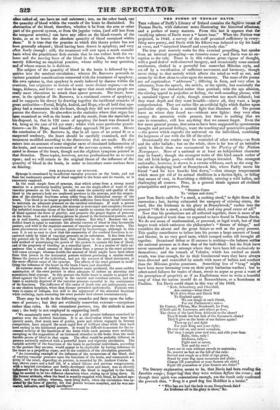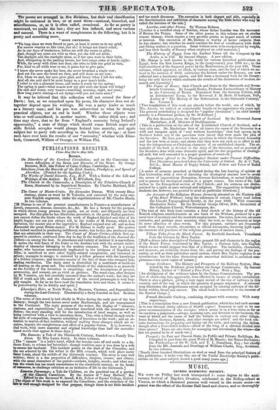THE POEMS OF THOMAS DAVIS.
Tins volume of Duffy's Library of Ireland contains the fugitive verses of Thomas Davis, with elaborate notes illustrating the historical allusions, and a preface of many matters. From this last it appease that the versifying talents of Davis were a " latent heat." When the Nation was projected, in 1842, a survey of the staff promised sufficiency in every- thing save poetry, and Davis with his fellows was induced to try his hand at verse, and "surprised himself and everybody else." The true poet scarcely waits for this external propelling, but speaks' from an internal prompting—an innatus amor ; and Davis was no ex- ception to the rule. There is in this volume great vigour of thought, with a good deal of well-observed imagery, and occasionally some natural sentiments, clothed in a powerful but somewhat Milesian style, and set off by a versification of sufficient movement and harmony, though never rising to that melody which affects the mind as well as ear, and seems by its flow alone to seize upon the memory. The mass of the poems are ad captandunt " addresses " ; differing in form, and very often in substance, from the speech, the article, or the epistle, but essentially the same. They are rhetorical rather than poetical; with the apt allusion, the stirring appeal to prejudice or feeling, the well-sounding phrase with a sustained vigour of style, though somewhat too much inflated; but they want depth and they want breadth—above all, they want a large comprehension. They are rather like an artificial light which flashes upon particular objects, than a natural light that illumines all. The poems leave us where they found us—without new lights : they very often occupy the attention while present, but there is nothing that we care to remember, still less anything that we cannot forget. Even the few more general poems, that seem to have been suggested by spontaneous thought and personal feelings, want the touching and penetrative qualities —the power which engrafts the universal on the individual, combining the largeness of one with the life of the other. Occasionally the reader may be reminded of other writers,—as Scott and the older ballads ; but on the whole, there is far less of an imitative spirit in Davis than was encountered in the Poetry of the Nation Newspaper. More of a national or at least an independent character may be found ; though the strongest traits of this kind smack rather of the old Irish hedge poet,—which was perhaps intended. The strongest nationality, however, is shown in a certain wildness, such as the song de- scribes as displaying itself at Donnybrook fair, where Paddy meets his friend "and for love knocks him down,"—that strange temperament which must get rid of its animal ebullition in a faction-fight, or failing that means of vent, in flourishing a shillelah, uttering a wild halloo, and challenging all corners. Thus, in a general tirade against all civilized principalities and powers, from
"Russian Czars To 'stripes and stars,'"
poor Tom Davis calls for "a steed, a rushing steed," to fight them all in succession; but, having exhausted the category of existing states, the bard, like the Irishman in his glory at Donnybrook,* rules into the general "Oh for a steed, a rushing steed, and any good cause at all?' Now that his productions are all collected together, there is more of an Irish disregard of truth than we expected to have found in Thomas Davis. We do not mean of mathematical, or personal, or legal truth, but of that larger truth which embraces the philosopher's "fitness of things," and considers the absent and the great future as well as the petty present. This quality contributes to infuse into his poems a large amount of boast and bluster, in no very good taste, which escaped notice till brought all together. Occasional defeat or ill success is nothing—the balance settlea the national account as it does that of the individual : but the Irish have never succeeded in any attempt where they have been left exclusively to themselves ; and the remark of Voltaire, which has excited so much wrath, was true enough, for in their Continental wars they have always been directed and controlled by minds with more of ballast and conduct than the Milesian genius possesses. Something less of "brag" might have been more becoming even on their petty barbarian warfare ; but to select noted failures for topics of chant, seems to argue as great a want of the perception of propriety as if an Englishman were to write a boastful song of what the nation would do at Bannockburn, or a Scotchman at Flodden. Yet Davis could chant in this way of the 1689.
"Kirk, Schomberg, and Churchill,
Are coming—what then? Well drive them and Dutch Will To England again; We can laugh at each threat,
For our Parliament's met—
De Courey, O'Brian, Mac Domhnaill, Le Poor,
O'Neill and St. Lawrence and others go Icor, The choice of the land from Athluain to the shore!
They'll break the last link of the Sacsanach chain I They'll give us the lands of our fathers again! Then up ye ! and fight For your King and your right;
Or ever toil on, and never complain,
Tho' they trample your roof-tree, and rifle your fame.
Rally, then rally ! Irishmen, Fight now or never, Now and for ever!
Laws are in vain without swords to maintain; So, muster as fast as the fall of the rain: Serried and rough as a field of ripe grain, Stand by your flag upon mountain and plain: Charge till yourselves or your foemen are slain! Fight till yourselves or your foemen are slain!"
The literary explanation seems to be, that Davis had been reading the Jacobite songs-; forgeitini that they were written before the event; and. though their spirit was ostentatious enough, yet the result only confirmed the proverb that, "Brag is a good dog but Holdfast is a better."
* " Who has ere had the luck to see Donnybrook fair? An Mailman all in his glory is there,* &e. The poems are arranged in five divisions, but their real classification might be embraced in two, or at most three—national, historical, and Miscellaneous, or, as it is often called, occasional. As far as poetry is Concerned, we prefer the last ; they are less inflated, and more various and natural. There is a want of completeness in the following, but it is pretty and something more.
"HOPE DEFERRED.
""Tis long since we were forced to .part, at least it seems so to my grief,
For sorrow wearies us like time, but shut brings not time's relief; As in our days of tenderness, before me still she seems to glide; And, though my arms are wide as then, yet she will not abide.
The daylight and the starlight shine, as if her eyes were in their light, And, whispering in the panting breeze, her love-songs come at lonely night: While, far away with those less dear, she tries to hide her grief in vain, For, kind to all while true to me, it pains her to give pain.
"I know she never spoke her love, she never breathed a single vow;
And yet I'm sure she loved me then and still doats on me now; For, when we met, her eyes grew gild, and heavy when I left her side; And oft she said she'd be most happy as a poor man's bride.
r toiled to win a pleasant home, and make it ready by the spring;
The spring is past--what season now my girl unto our home will bring? Pm nick and weary, very weary—watching, morning, night, and noon; How long you're coming—I am dying—will you not come soon?"
It may be inferred that this collection will not extend the fame of Davis ; but, as we remarked upon his prose, his character does not al- together depend upon his writings. He was a party leader as much as a literary man ; and his pen was subservient to what he thought practical objects, not an end in itself. Whether those objects were wise or well-considered, is another matter. We rather think not ; and time may show, that so far from "England's necessity being Ireland's opportunity," a state of things which should rouse British auger and Stifle British scruples would plunge Ireland into anarchy, and again subject her to party rule according to the fashion of the age : at least such have ever been the results of our "necessity," whether with Eliza- beth, Cromwell, William of Orange, or William Pitt.











































 Previous page
Previous page